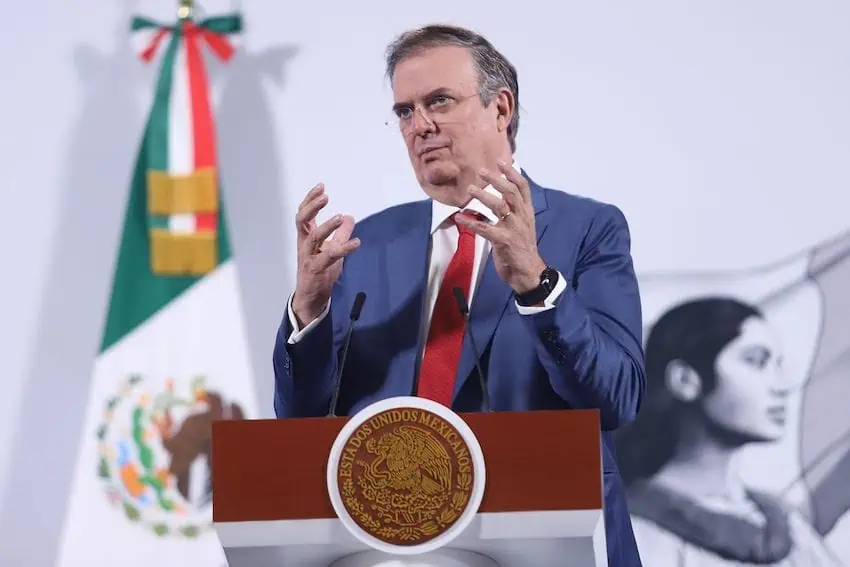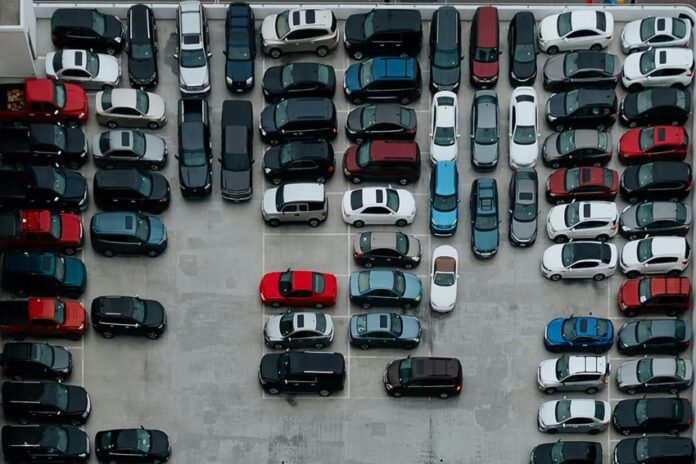Economy Minister Marcelo Ebrard said Tuesday that vehicles assembled in Mexico will face an average tariff of 15% when exported to the United States, significantly lower than the 25% duty the U.S. applies to most other foreign cars.
“It’s a very big advantage compared to other countries that export to the United States,” Ebrard said at an event in Mexico City.
“Of course, we would love it to be zero,” he added.
His remarks came the same day that the United States Department of Commerce published the “Procedures for Submissions” by importers of automobiles that qualify for preferential treatment under the USMCA, the North American free trade pact that superseded NAFTA in 2020.
United States President Donald Trump announced in late March that he would impose a 25% tariff “on all cars that are not made in the United States,” but U.S. content in vehicles assembled in Mexico was exempted from the duty, lowering the effective tariff on vehicles made in Mexico. The tariff took effect in early April.
The “procedures” published by the U.S. Department of Commerce in the Federal Register detail what importers of vehicles from Mexico and Canada need to do to be exempt from paying a tariff on the U.S. content in those vehicles (see below).
Ebrard: Tariff ‘discount’ could be as high as 50%
Ebrard said that vehicles assembled in Mexico are eligible for a “discount” on the 25% tariff announced by Trump in late March.

He said that the “discount” would be 40%, on average, but could be as high as 50% — if a vehicle has 50% U.S. content.
Guillermo Rosales, president of the Mexican Association of Automotive Distributors, said in March that a vehicle made in Mexico for export to the United States has, on average, 40% U.S. content. The effective tariff on a vehicle assembled in Mexico with 40% U.S. content is 15%.
In the notice it published on Tuesday, the U.S. Commerce Department said it was making “the assumption that the approximate amount of U.S. content” in vehicles made in Mexico and exported to the U.S. “is equal to 40 percent of the value of the vehicle.”
Thus, Ebrard said that the average tariff on vehicles made in Mexico and exported to the United States will be 15%.
If a car assembled in Mexico has 50% U.S. content, it will face an effective tariff rate of 12.5% when shipped to the United States. A Mexican-made car with only 30% U.S. content will face a 17.5% U.S. tariff.
Ebrard said that the preferential treatment afforded to Mexico is the result of the frequent meetings between Mexican officials and U.S. officials, including Commerce Secretary Howard Lutnick and Trade Representative Jamieson Greer.
“You can imagine what would happen without … [this treatment],” he said, referring to the economic damage a full 25% tariff would inflict on Mexico’s auto sector, which exported more than 2.6 million cars to the United States last year, according to U.S. data.
Ebrard has led Mexico’s trade negotiations with the United States, traveling to Washington on repeated occasions to present the Mexican government’s case against auto, steel and aluminum tariffs.
Mexican auto parts that comply with the USMCA are exempt from 25% duties imposed by the U.S on imports from most other countries in early May.
The National Auto Parts Industry reported earlier this month that 92% of the Mexican auto parts sector will not be subject to the 25% U.S. tariff as nearly all manufacturing complies with current trade rules.
Importers of Mexican vehicles must submit documentation to avoid full tariff
According to the “Procedures for Submissions by Importers of Automobiles Qualifying for Preferential Tariff Treatment Under the USMCA To Determine U.S. Content,” only vehicles imported to the U.S. from Mexico and Canada may be found to be eligible to apply the 25% tariff “exclusively to the value of the non-U.S. content of the automobile.”
As of Tuesday May 20, importers of Mexican vehicles seeking preferential treatment on the U.S. content in the automobiles “may submit documentation, on a model line basis, identifying the type and value of U.S. content attributable to each model line imported into the United States,” according to the Commerce Department notice in the Federal Register.
Their documentation will be reviewed “for completeness and compliance” by the Commerce Department, the notice said.
If a submission is deemed to be in order, an importer won’t be required to pay the 25% tariff on the U.S. content on vehicles they are bringing into the United States.
The Commerce Department notice said that the commerce secretary “may retroactively extend this [preferential] treatment to qualifying model lines for vehicles imported on or after April 3, 2025, at his discretion,” meaning that importers could be partially reimbursed for tariffs they have already paid.
The notice said that if Customs and Border Protection “determines that the declared U.S. content is overstated or inconsistent with a U.S. content figure approved by the Secretary, the [full] 25 percent tariff will apply retroactively (from April 3, 2025, to the date of the inaccurate overstatement) and prospectively.”
Ebrard said he considered the Commerce Department notice to be “very positive,” given that it establishes “preferential treatment for the auto industry in Mexico and Canada.”
‘For many companies, the tariff will continue being close to 25%’
While Ebrard celebrated the preferential auto tariff treatment afforded to Mexico by the United States, the president of Global Alliance Solutions, an international trade services company that specializes in Mexico-U.S. customs brokerage, highlighted that not all vehicles made in Mexico will qualify for a 15% tariff rate when shipped to the U.S.
Adrián González said that while U.S. automakers such as Ford and General Motors might have 40% (or higher) U.S. content in the vehicles they make in Mexico, Japanese and German manufacturers do not.
Therefore, “for many companies, the tariff will continue being close to 25%,” he said.
Volkswagen, Toyota and Nissan are among the non-U.S. automakers that have plants in Mexico.
Under USMCA rules — and before Trump imposed the new auto tariff — a vehicle could enter the United States tariff-free provided at least 75% of the value of its content was from North America, i.e. Mexico, the U.S. and Canada.
González highlighted that the United States has agreed to cut its auto tariff on vehicles from the United Kingdom to 10% for 100,000 cars a year, and asserted that “Mexico should aspire to something similar, or even push for zero given the economic integration with the United States.”
With reports from Reforma, El Economista, El Financiero, Reuters, López-Dóriga Digital and La Jornada
